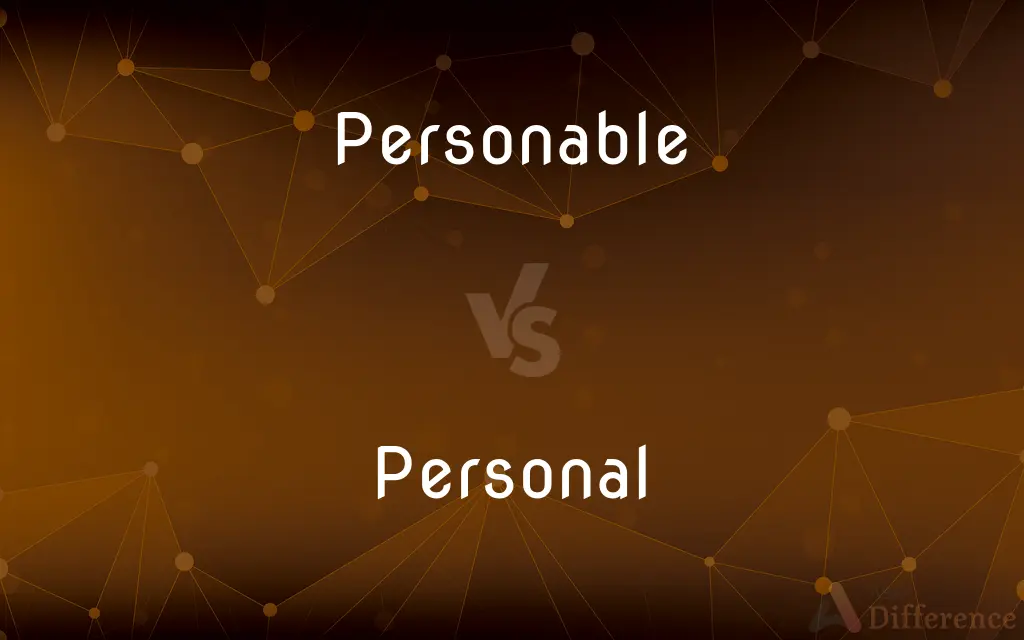Personable vs. Personal — What's the Difference?
By Fiza Rafique & Urooj Arif — Updated on April 1, 2024
Personable refers to someone's pleasant and amiable qualities that make them likable and easy to relate to, while personal pertains to something private or specific to an individual, highlighting uniqueness or individuality.

Difference Between Personable and Personal
Table of Contents
ADVERTISEMENT
Key Differences
Personable describes an individual's demeanor or characteristics that are appealing in social interactions, implying warmth, friendliness, and approachability. It often relates to the ability to make others feel comfortable and valued. On the other hand, personal relates to aspects, belongings, or features that are intimately associated with a specific individual, emphasizing privacy, individuality, or the distinct nature of something as it pertains to a person.
While "personable" is exclusively used to describe individuals or their attributes that are socially engaging and charismatic, "personal" can apply to a wide range of things, including possessions (like personal belongings), experiences (personal stories), spaces (personal space), and attributes (personal opinions). This makes "personal" a more versatile term that can describe anything closely related to or affecting an individual, without necessarily implying any social qualities.
Personable qualities are particularly valued in roles or contexts where interpersonal skills are crucial, such as customer service, leadership, and networking. These traits can significantly enhance one's social interactions and relationships. In contrast, personal matters or items are usually considered private and are protected or kept confidential, reflecting the boundaries individuals maintain between their private lives and the outside world.
The appeal of a personable individual often lies in their ability to establish a rapport and connect with others easily, making them well-liked and respected in both professional and personal settings. Conversely, personal preferences, experiences, or belongings are central to one’s identity and autonomy, underscoring the importance of respect for privacy and individual rights.
Both "personable" and "personal" play significant roles in social and individual contexts, with the former enhancing social cohesion and interaction, and the latter safeguarding individual privacy and identity. Understanding the distinction between these concepts is crucial for effective communication and maintaining respectful interpersonal relationships.
ADVERTISEMENT
Comparison Chart
Definition
Relating to someone's amiable and likable qualities.
Relating to private, individual aspects of someone's life.
Application
Describes people and their engaging traits.
Describes anything specific to an individual, including traits, belongings, and experiences.
Implications
Social attractiveness and ease of interaction.
Privacy, individuality, and personal boundaries.
Contexts
Professional and social settings where interpersonal skills are valued.
Any context involving individual rights, privacy, or identity.
Key Qualities
Warmth, friendliness, approachability.
Uniqueness, privacy, individuality.
Compare with Definitions
Personable
Having a friendly and attractive personality.
Her personable nature makes her an excellent customer service representative.
Personal
Relating to or affecting a particular person rather than anyone else.
She keeps her personal life separate from her work.
Personable
Pleasant and easy to relate to; amiable.
The new teacher is very personable, quickly becoming a favorite among students.
Personal
Of or pertaining to one's private life, relationships, and emotions.
He rarely shares personal details with colleagues.
Personable
Showing qualities that are appealing in social interactions.
Our team leader is very personable, always listening to our concerns.
Personal
Concerning the private aspects of someone's life.
Respecting personal boundaries is crucial in any relationship.
Personable
Capable of making others feel at ease.
He's quite personable at parties, always surrounded by people.
Personal
Belonging to a specific person; private.
Please refrain from using the office computer for personal tasks.
Personable
Desirable trait in professional and personal relationships.
Being personable is a key asset in the hospitality industry.
Personal
Reflecting personal choice or individual preference.
Everyone has their personal reasons for making certain decisions.
Personable
Pleasantly sociable.
Personal
Belonging to or affecting a particular person rather than anyone else
Her personal fortune was recently estimated at £37 million
Personable
Pleasing in appearance; attractive.
Personal
Of or concerning one's private life, relationships, and emotions rather than one's career or public life
The book describes his sporting career and gives little information about his personal life
Personable
(of a person) Having a pleasing appearance; attractive; handsome.
Personal
Relating to a person's body
Personal hygiene
Personable
(of a person) Having a pleasant or manner; friendly; amiable.
Personal
Of or denoting one of the three persons.
Personable
Enabled to maintain pleas in court.
Personal
Existing as a self-aware entity, not as an abstraction or an impersonal force
He rejected the notion of a personal God
Personable
Having a well-formed body, or person; graceful; comely; of good appearance; presentable; as, a personable man or woman.
Wise, warlike, personable, courteous, and kind.
The king, . . . so visited with sickness, was not personable.
Personal
An advertisement or message in the personal column of a newspaper.
Personable
Enabled to maintain pleas in court.
Personal
Of or relating to a particular person; private
“Like their personal lives, women's history is fragmented, interrupted” (Elizabeth Janeway).
Personable
(of persons) pleasant in appearance and personality
Personal
Done, made, or performed in person
A personal appearance.
Personal
Done to or for or directed toward a particular person
A personal favor.
Personal
Concerning a particular person and that person's private business, interests, or activities; intimate
I have something personal to tell you.
Personal
Aimed pointedly at the most intimate aspects of a person, especially in a critical or hostile manner
An uncalled-for, highly personal remark.
Personal
Tending to make remarks, or be unduly questioning, about another's affairs
As the student debate got heated, it got personal.
Personal
Of or relating to the body or physical being
Personal cleanliness.
Personal
Relating to or having the nature of a person or self-conscious being
Belief in a personal God.
Personal
(Law) Of or relating to the person
Personal property as opposed to real property.
Personal jurisdiction as opposed to in rem jurisdiction.
Personal
(Grammar) Indicating grammatical person.
Personal
A personal item or notice in a newspaper.
Personal
Personals A column in a newspaper or magazine featuring personal notices.
Personal
Pertaining to persons (human beings as opposed to things or animals).
Personal
Of or pertaining to a particular person; relating to, or affecting, an individual, or each of many individuals
Her song was her personal look at the values of friendship.
Personal values
Personal desire
Personal
Dealing with subjects about which one wishes (or people usually wish) to maintain privacy or discretion; not for public view; sensitive, intimate.
You can't read my diary—it is personal.
That's a very personal question.
I can't believe you went through my drawers and looked at all my personal things!
Personal reasons
Personal
Pertaining to the external or bodily appearance; corporeal; bodily.
Personal charms
Personal
Done in person; without an intermediary.
A personal interview
A personal meeting
Personal settings
Personal
Relating to an individual, their character, conduct, motives, or private affairs, in an invidious and offensive manner
Personal reflections or remarks
Personal
(grammar) Denoting a person or people.
A personal pronoun
Personal
Denoting ownership.
One's personal vehicle, as opposed to a company vehicle
Personal
An advertisement by which an individual attempts to meet others with similar interests.
Personal
One's own property or asset
Personal
Pertaining to human beings as distinct from things.
Every man so termed by way of personal difference.
Personal
Of or pertaining to a particular person; relating to, or affecting, an individual, or each of many individuals; peculiar or proper to private concerns; not public or general; as, personal comfort; personal desire.
The words are conditional, - If thou doest well, - and so personal to Cain.
Personal
Pertaining to the external or bodily appearance; corporeal; as, personal charms.
Personal
Done in person; without the intervention of another.
The immediate and personal speaking of God.
Personal
Relating to an individual, his character, conduct, motives, or private affairs, in an invidious and offensive manner; as, personal reflections or remarks.
Personal
Denoting person; as, a personal pronoun.
Personal
A movable; a chattel.
Personal
A short newspaper article about a particular person or group
Personal
Concerning or affecting a particular person or his or her private life and personality;
A personal favor
For your personal use
Personal papers
I have something personal to tell you
A personal God
He has his personal bank account and she has hers
Personal
Particular to a given individual
Personal
Of or arising from personality;
Personal magnetism
Personal
Intimately concerning a person's body or physical being;
Personal hygiene
Personal
Indicating grammatical person;
Personal verb endings
Common Curiosities
Is it important to keep personal matters private in professional settings?
Generally, yes. Maintaining a distinction between personal and professional life helps to preserve professional boundaries and respect among colleagues.
Can "personal" ever be used positively in social contexts?
Yes, "personal" can have positive connotations, especially when referring to personal achievements, personal growth, or the value of personal relationships.
How can someone become more personable?
Becoming more personable often involves developing empathy, listening skills, and the ability to engage warmly and authentically with others.
Can a personable individual have a strong personal presence?
Absolutely. A personable individual can also have a strong personal presence, characterized by a distinctive and engaging personality that is memorable and impactful.
Can personal achievements enhance a person's personability?
Personal achievements can contribute to a person's charisma and appeal, making them more interesting and engaging to others, thus potentially enhancing their personability.
How does culture influence personal and personable behaviors?
Culture significantly influences what is considered personable behavior and personal privacy norms, affecting how individuals interact and what they share about themselves.
How do personal choices impact social interactions?
Personal choices, such as interests, hobbies, and opinions, can greatly influence social interactions, contributing to shared experiences and understanding, or sometimes, differences and conflicts.
Can a personal interest become a personable trait?
Yes, personal interests can contribute to a person’s personability when shared appropriately, as they can add depth to social interactions and foster connections with others.
Why is respecting personal boundaries important in being personable?
Respecting personal boundaries is crucial because it demonstrates empathy, respect, and understanding, which are key components of being personable and establishing positive social interactions.
What role does privacy play in personal and personable distinctions?
Privacy is central to the concept of personal matters, indicating what individuals choose to keep private, whereas personability involves how openly and effectively one interacts socially, which might include sharing or withholding personal information judiciously.
Share Your Discovery

Previous Comparison
Reward vs. Punishment
Next Comparison
Guideline vs. InstructionAuthor Spotlight
Written by
Fiza RafiqueFiza Rafique is a skilled content writer at AskDifference.com, where she meticulously refines and enhances written pieces. Drawing from her vast editorial expertise, Fiza ensures clarity, accuracy, and precision in every article. Passionate about language, she continually seeks to elevate the quality of content for readers worldwide.
Co-written by
Urooj ArifUrooj is a skilled content writer at Ask Difference, known for her exceptional ability to simplify complex topics into engaging and informative content. With a passion for research and a flair for clear, concise writing, she consistently delivers articles that resonate with our diverse audience.














































